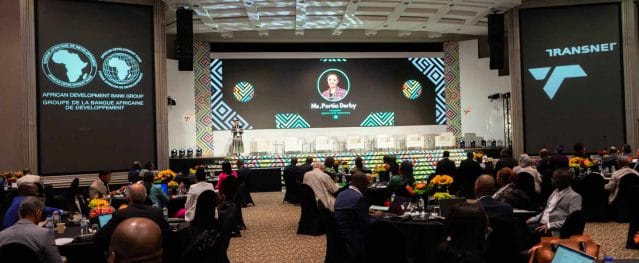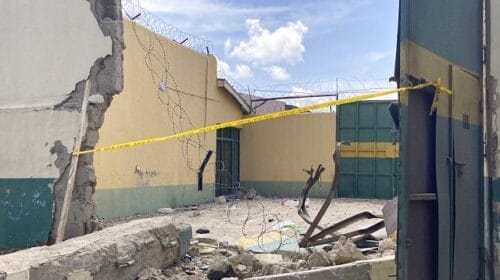Move Africa’s industrialization goals and trade competitiveness with network planning and implementation at a regional cross border level now -…

Joint network lifetime planning and implementation of regional borderless crossings are key tools for the scaling up of integrated regional freight transport and logistics systems in Africa, participants at a conference to highlight the financing gap for African infrastructure heard.
The focus of the one-day conference, organized by the African Development Bank and Transnet on 23 September 2022, was building integrated regional freight systems to boost intra-African trade and Africa’s global trading position. The conference also highlighted the benefits of the African Continental Free trade Area agreement ( Afcfta) to this end.
The conference was attended by representatives of government utilities, agencies, industry players and development partners.
African Development Bank vice president for Private Sector, Infrastructure and Industrialization, Solomon Quaynor, setting the context for the discussions, emphasized the importance of rail infrastructure to the region’s growth.
He described Afcfta, which created a single market of over one billion people with a combined GDP of over $3.4 trillion, as a game changer for the continent.
“It is absolutely essential that we do not create the largest single free trade area of consumption, but rather one of industrialization where we add value to our natural resources,” he said.
The checklist of essentials to ensure growth includes economic corridors, fully established cross-border railways and ports, integrated with industrialization spaces, “more value addition, not just commodity based,” Quaynor said.
Quaynor urged participants to explore financing models for corridors that included Public-Private Partnerships or PPPs and blended financing.
“We need to explore various financing models, and we need to think of this differently. For example, we need to finance corridors and not just national railways networks. We need to think PPP to leverage limited public capital, but we have to be aware of the risks that private sector will not bear,” he said.
The vice president also touched on the need and demand for digital solutions across regional freight transport corridors and the importance of improving operational efficiency. He said issues such as customs and labor laws applicable to railways freight operations, should be resolved to achieve seamless and integrated efficient freight operations along the entire cross border economic corridors.
“Joint network lifetime planning on a regional cross border basis is urgently needed. For example, SADC is working with the Southern Africa Railways Association (SARA) to develop a regional railway masterplan,” he said.
Transnet, a large South African rail, port, pipeline and freight logistics service provider with freight rail being the largest of its five (5) operating divisions, aims to expand economic infrastructure, create jobs and build a skilled and capable workforce.
Since 2010, the African Development Bank has invested a total $500 million in Transnet, towards a portion of its capital expenditure program The financing has been key to addressing operational challenges including boosting freight capacity from 80mt to 176mt through acquisition of modern rolling stock. This will improve operational efficiency and position the company as a strategic regional player.
Transnet Group Chief Executive, Portia Derby said despite challenges of inflation, price hikes, and high interest rates, the southern Africa region still stands to move ahead. Sharing experiences from Ghana, Cote d’Ivoire and Mozambique, she said Transnet had learned much about the strategic ways infrastructure can be integrated into a common planning platform.
“Members talking to each other is essential because it is about creating a platform for solving short and long-term development plans,” she said.
Derby said the partnership of the African Development Bank had been crucial for both financing and advice.
“AfDB promised that they would be with us and they have. Let’s be hopelessly ambitious,” she said.
Infrastructure long-term investment
With infrastructure being a long-term investment, Mike Salawou, Acting Director for the Infrastructure and Urban Development Department at the African Development Bank said its history of providing long-term financing, project preparation platforms and de-risking instruments, made it the first choice for those seeking financing.
“The role of MDBs is to prudently take on the risk that other lenders are usually unwilling to take,” Salawou said.
African Development Bank Deputy Director General for the southern Africa region Dr. Kennedy Mbekeani and country managers from Mozambique, Malawi, Zimbabwe and Zambia, also attended the event.
Earlier in a video address, South African Minister of Public Enterprises Pravin Gordhan said change for the sector would require the continent to be more assertive and to pay attention to the political choices made by political players which “massively influences the extent of the continent’s development growth.” He called for “a new level of cooperation and assertiveness.”
“The next challenge is both how to compete and cooperate with one another,” Gordhan said. The minister also implored countries of the continent “to get impatient with each other for things to move forward.”
African Development Bank Deputy Director for the southern Africa region Kennedy Mbekeani also noted the hand of the African Development Bank Group in driving development of ports, roads and rail on the continent under its high 5 strategy of regional integration and cross-border initiatives.
“The African Development Bank leads in infrastructure financing on the continent. We look to conferences like these to increase the opportunities for new projects and partnerships as well as interest in our services,” Mbekeani said.




